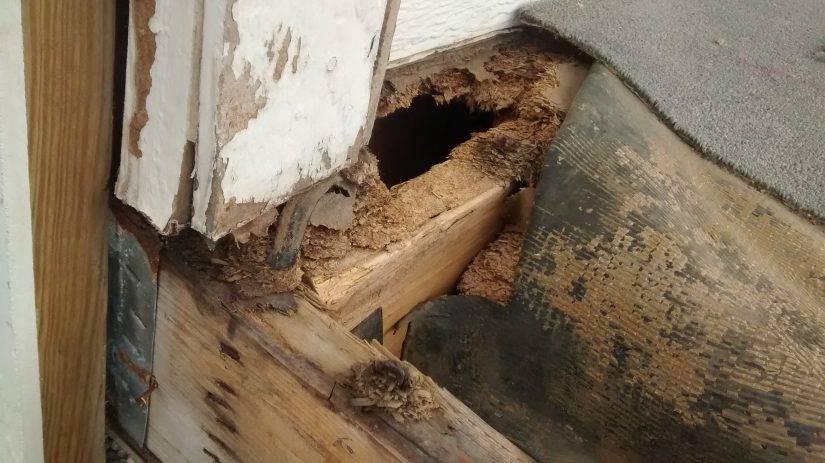If your home is under attack by termites, we are here to help. At Home Care Contractors, our specialty is repairing termite damaged wood elements, such as your home’s framing. If you have a problem with these little insects, we have solutions to correct it and help you keep these critters away.
Home Care Contractors: Termite Repair
There is nothing positive to be said about having termites in your home. To make matters worse, you may have those uninvited critters in your house for a long time before noticing that anything is wrong. Additionally, there are different types of termites that can invade a home and it is difficult to know when they are the culprits of the damage, particularly when you don’t know what to look for.
Drywood termites, for example, tend to burrow within wooden structures be it walls, roofs, floors, or pieces of furniture. Subterranean termites, on the other hand, can be found mainly underground and are much tougher to discover.
What signs of termite activity should you be on the lookout for?
Unfortunately for homeowners, termites do not confine their activity to a single spot. They can cover the entire house and cause considerable damage if not detected in time. That is why it is so important to be aware of signs of termite activity. Here are some of them:

- Peeling paint that looks like water damage even though no water is present
- Wood that sounds hollow when tapped and did not sound this way previously
- Drooping or discolored drywall
- Laminate or wooden floorboards that unexplainably start to buckle
- Tiny, pinpoint holes in the walls
- Loose tiles due to added moisture that termites bring in to your floor
- Wood that starts to crumble or looks damaged
- Doors or windows that get stuck
- Floorboards that turn excessively squeaky for no apparent reason
- Mounds of drywood termite pellets that look like small piles of salt or pepper
- Miniscule wings that may resemble fish scales
- Flying termite swarms
Where can termite swarms take place?
Either inside or outside your home, mature termites abandon their original nest in order to start their own colonies. As they start flying, they will shed their wings and these may get trapped in spiderwebs, land on windowsills, or fall to the ground.
What is the best time to check for termites?
Obviously, any time you see something suspicious is a good time to call your termite repair experts. Otherwise, be particularly observant during the spring. This is because termites like damp, warm weather and tend to swarm during those months. You may actually see clouds of termites in your basement or near any light sources.
Can you confuse termites with other critters?
You could. Carpenter ants tend to appear in big numbers as do insects like house borers or powder post beetles that may also mislead you. When in doubt, call our experts at Home Care Contractors. They will help you determine the kind of infestation you have and how to treat it successfully.
What should you expect from your termite control experts?
At Home Care Contractors our experienced professionals will start the job by identifying where the existing infestations are located and take actions in order to prevent future infestations.
After a comprehensive inspection of every area of your home and the grounds, a custom treatment will be prepared to ensure the protection of your largest investment – your home. Our professionals will explain their recommendations for treatment techniques based on the construction type of your home. Once the treatment is applied, you will be issued a warranty that states that if this problem were to reappear it will be treated at no additional cost.
Rest assured that the best results are obtained when we apply the treatment option that has been specifically designed for your home.
How long does it take to repair termite damage?
This depends on the size of the home but, in general terms, they can be exterminated in one day. Our products are designed to protect your home for up to five years. However, once you have found a termite infestation in your home, it is recommended that you have your home inspected every year to catch any termites that might be trying to recolonize their previous nests.
A properly applied extermination treatment will have a termite colony dying off within a few days after application. It takes a few days because every member of the colony needs to come in contact with the chemicals in the treatment. A professional termite exterminator will have the knowledge to decide how much of the chemical agents to apply and where to spread it, which is why self-applied home treatments tend not to yield the desired results. And you certainly do not want to have a few termites surviving the treatment and multiplying quickly to give you additional headaches and worries about the stability of your home.
Is it worth buying a house with termite damage?
Finding termites during a home inspection is a definite red flag. It can make you doubt whether buying that property is a good idea after all. You may actually consider it a scary deal-breaker. However, before you get ready to start looking someplace else, there are a few points you might like to consider.
To begin with, find out precisely how bad the damage is. The inspector may have something to say as to how to get rid of the termites. Once you have that information, you should renegotiate with the seller.
If you are unsure as to the extent of the damage or if the home inspector recommends it, ask for a specialized pest control inspection. It is only after you have that specialized report you may make a sound decision on the state of the home and your willingness to go ahead with the purchase. And if you decide to do so, it might be a good idea to consider specialty coverage when you purchase your homeowner’s insurance. You may also want to call us to schedule an ongoing treatment plan.
Also, you may wish to ask the seller to tent the home to perform a full termite extermination treatment before closing on the property and moving in.
Is termite damage covered by a home warranty?
As mentioned above, your home warranty will not cover termites. This policy will mainly cover appliances and systems such as electrical or plumbing, water heaters, or HVAC.
You need to make sure that all systems in your home are properly maintained and functioning if you want to decrease the risk of a termite infestation. What also helps is keeping everything dry. Allowing leaks to go unrepaired may be the breeding ground termites need to settle in your home.
Talk to your insurance agent and purchase a specialized policy for termites to avoid any problems in the future. And if they do not offer those policies, talk to your pest control experts to find out if a termite policy is offered.
How do you cover termite damage?
A termite infestation can cause a great deal of damage to any home. Although in general terms termites are not covered by homeowner’s insurance, there may be certain exceptional scenarios when this may not be true. An example is a case in which termites chew through a home’s wiring, causing a fire. In this instance, your insurance policy may step in to pay for the damages. This is because fire is a covered item under the majority of policies.
If you have not reviewed your policy recently, it might be a good idea to do so before you are facing damage that may not be covered. And if it is not clear, a phone call to your insurance agent might put your mind to rest.
Can you prevent termites from damaging your home?
For your home to avoid any termite damage, two things must happen: you must prevent them from gaining access and, if they do, you must treat all known colonies. These are some steps you can take to win the battle against termites:
- Schedule annual termite inspections from a qualified expert.
- Reduce termite food sources by removing dead trees, firewood, and any other piece of deadwood that can be ideal for housing drywood termites. Check out your roof shingles to spot possible termite damage.
- Avoid bringing old wood into your home for decorative purposes, such as old railroad ties that may bring those uninvited guests into your home.
- Be vigilant of areas of your home where non-pressure treated wood material is in direct contact with earth. This moisture to wall contact is the perfect breeding ground for termites because it offers them food, moisture, and protection.
- Address conditions around your home that may be conducive to encouraging termite activity. Your pest control professional can point these out to you.
- Seal gaps around gas and water lines at the point where they enter your home.
- If your home has wood siding, make sure it is at least six inches above the ground.
- Check to see if there is an accumulation of water close to your foundation or on your roof.
- If you have landscaping mulch, replace it with a cellulose-free alternative or make sure it stays at least six inches from your foundation.
- Your pest control expert can also recommend preventative termite treatments, monitoring systems, direct wood treatments, and other actions that, based on your home’s construction type and other signs of termite activity in your neighborhood, will yield optimal termite prevention results.
Our Home Repair Experts Can Fix Termite Damage to Your Home Quickly and Affordably!
Termites are a homeowner’s worst nightmare. They eat wood and will eat away at your home’s foundation over time. Termites often target your wall studs and the rafters in your roof. If you recently discovered that termites have invaded your home, you need to know what you can do to repair the damage. At Home Care Contractors, our termite repair specialists have decades of experience in repairing termite damage in Everett area homes. You don’t have to live in fear that termites will destroy your home while you are sleeping. Whether you see or suspect termite damage in your home, give us a call today.







